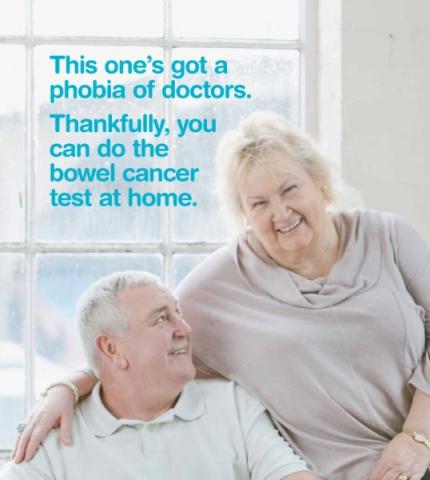Detecting bowel cancer early saves lives

Bowel cancer is the second most common cancer in Northern Ireland and over 400 people die from the disease each year. However, the good news is that early detection can make a real difference as to whether someone with bowel cancer survives.
To mark Bowel Cancer Awareness Month in April, the Public Health Agency (PHA) is urging everyone to be aware of the early signs and symptoms of the disease. Bowel cancer can occur at any age and symptoms can include:
- bleeding from your bottom, or blood in your bowel motion;
- a change in bowel habit lasting three weeks or more, especially if it becomes looser;
- unexplained weight loss;
- pain or swelling in your abdomen;
- extreme tiredness for no obvious reason.
Not everyone with these symptoms will have cancer, but if you are concerned that you have one or more of these symptoms, you should seek advice from your doctor at an early stage.
Men and women aged between 60 and 71 also have the opportunity to take part in the bowel cancer screening programme. PHA has revealed that only half of people who receive the potentially life-saving kit are completing it, meaning that lives could be lost needlessly.
Dr Tracy Owen, Consultant in Public Health Medicine, PHA, said: “Around 1,000 people get bowel cancer in Northern Ireland each year, and over 400 people die from the illness.
“Bowel cancer screening could save approximately 60 lives a year here, but only around 50% of people who receive the potentially life-saving screening kit are completing it. This means that many people are missing an opportunity to detect cancer early at a stage before symptoms even appear.”
“This is hugely significant because when detected at a very early stage, treatment for bowel cancer can be 90% successful. I strongly encourage everyone who is eligible, to participate in the screening programme."
Dr Owen continued: “The home test kit, which people receive in the post, can be completed easily in the privacy of a person’s own home and returned to the laboratory for analysis. It is hoped that as the test is carried out at home, more people will respond, particularly men, who often find health issues difficult to talk about.”
“The kit is used to detect traces of blood in the bowel motion, which indicates that further tests need to be carried out. Most people who are tested will have no blood in their bowel motions and will be invited to repeat the screening test again in two years time.”
Since the screening programme started in April 2010, almost 100 people in Northern Ireland have been diagnosed with bowel cancer as a result of screening.
Those eligible for screening will receive a test kit in the post at the home address provided by their GP. It is therefore also important that your GP has your most up-to-date address and correct date of birth or you may miss the chance to take part in the programme.
For further information on the screening programme and what it involves, visit www.cancerscreening.hscni.net
Contact the Public Health Agency on 028 9055 3663
